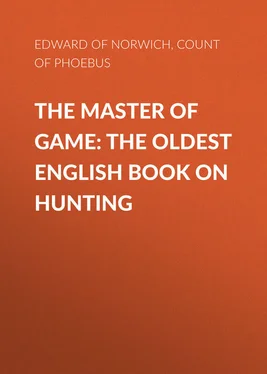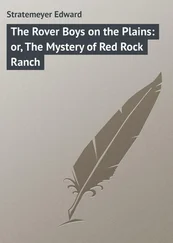Edward Array - The Master of Game - The Oldest English Book on Hunting
Здесь есть возможность читать онлайн «Edward Array - The Master of Game - The Oldest English Book on Hunting» — ознакомительный отрывок электронной книги совершенно бесплатно, а после прочтения отрывка купить полную версию. В некоторых случаях можно слушать аудио, скачать через торрент в формате fb2 и присутствует краткое содержание. Жанр: Хобби и ремесла, foreign_antique, foreign_prose, на английском языке. Описание произведения, (предисловие) а так же отзывы посетителей доступны на портале библиотеки ЛибКат.
- Название:The Master of Game: The Oldest English Book on Hunting
- Автор:
- Жанр:
- Год:неизвестен
- ISBN:нет данных
- Рейтинг книги:5 / 5. Голосов: 1
-
Избранное:Добавить в избранное
- Отзывы:
-
Ваша оценка:
- 100
- 1
- 2
- 3
- 4
- 5
The Master of Game: The Oldest English Book on Hunting: краткое содержание, описание и аннотация
Предлагаем к чтению аннотацию, описание, краткое содержание или предисловие (зависит от того, что написал сам автор книги «The Master of Game: The Oldest English Book on Hunting»). Если вы не нашли необходимую информацию о книге — напишите в комментариях, мы постараемся отыскать её.
The Master of Game: The Oldest English Book on Hunting — читать онлайн ознакомительный отрывок
Ниже представлен текст книги, разбитый по страницам. Система сохранения места последней прочитанной страницы, позволяет с удобством читать онлайн бесплатно книгу «The Master of Game: The Oldest English Book on Hunting», без необходимости каждый раз заново искать на чём Вы остановились. Поставьте закладку, и сможете в любой момент перейти на страницу, на которой закончили чтение.
Интервал:
Закладка:
They have not a great tail and do not gather venison as I have said, the greatest grease that they may have within is when the kidneys be covered all white. When the hounds hunt after the roebuck they turn again into their haunts and sometimes turn again to the hounds 59 59 "They ring about in their own country, and often bound back to the hounds" would be a better translation.
. When they see that they cannot dure 60 60 From the French durer , to last.
(last) they leave the country and run right long ere they be dead. And they run in and out a long time and beat the brooks in the same way a hart doth. And if the roebuck were as fair a beast as the hart, I hold that it were a fairer hunting than that of the hart, for it lasteth all the year and is good hunting and requires great mastery, for they run right long and gynnously (cunningly). Although they mew their heads they do not reburnish them, nor repair their hair till new grass time. It is a diverse (peculiar) beast, for it doth nothing after the nature of any other beast, and he followeth men into their houses, for when he is hunted and overcome he knoweth never where he goeth. The flesh of the roebuck is the most wholesome to eat of any other wild beast's flesh, they live on good herbs and other woods and vines and on briars and hawthorns 61 61 G. de F. says "acorns."
with leaves and on all growth of young trees. When the female has her kids she does all in the manner as I have said of a hind. When they be in bucking they sing a right foul song, for it seemeth as if they were bitten by hounds. When they run at their ease they run ever with leaps, but when they be weary or followed by hounds they run naturally and sometimes they trot or go apace, and sometimes they hasten and do not leap, and then men say that the roebuck hath lost his leaps, and they say amiss, for he ever leaves off leaping when he is well hasted and also when he is weary.
When he runneth at the beginning, as I have said, he runneth with leaps and with rugged standing hair and the eres 62 62 Middle English ars , hinder parts called target of roebuck.
(target) and the tail cropping up all white.
And when he hath run long his hair lyeth sleek down, not standing nor rugged and his eres (target) does not show so white.
And when he can run no longer he cometh and yieldeth himself to some small brook, and when he hath long beaten the brook upward or downward he remaineth in the water under some roots so that there is nothing out of water save his head.
And sometimes the hounds and the hunters shall pass above him and beside him and he will not stir. For although he be a foolish beast he has many ruses and treasons to help himself. He runneth wondrous fast, for when he starts from his lair he will go faster than a brace of good greyhounds. They haunt thick coverts of wood, or thick heathes, and sometimes in carres (marshes) and commonly in high countries or in hills and valleys and sometimes in the plains.
The kids are kidded with pomeled 63 63 From the old French pomelé .
(spotted) hair as are the hind calves. And as a hind's calf of the first year beginneth to put out his head, in the same wise does he put out his small brokes 64 64 See Appendix: Roe.
(spikes) ere he be a twelvemonth old. He is hardeled 65 65 See Appendix: Hardel.
but not undone as a hart, for he has no venison that men should lay in salt. And sometimes he is given all to the hounds, and sometimes only a part. They go to their feeding as other beasts do, in the morning and in the evening, and then they go to their lair. The roebuck remains commonly in the same country both winter and summer if he be not grieved or hunted out thereof.
CHAPTER VI
OF THE WILD BOAR AND OF HIS NATURE
A wild boar is a common beast enough and therefore it needeth not to tell of his making, for there be few gentlemen that have not seen some of them. It is the beast of this world that is strongest armed, and can sooner slay a man than any other. Neither is there any beast that he could not slay if they were alone sooner than that other beast could slay him, 66 66 In spite of the boar being such a dangerous animal a wound from his tusk was not considered so fatal as one from the antlers of a stag. An old fourteenth-century saying was: "Pour le sanglier faut le mire, mais pour le cerf convient la bière."
be they lion or leopard, unless they should leap upon his back, so that he could not turn on them with his teeth. And there is neither lion nor leopard that slayeth a man at one stroke as a boar doth, for they mostly kill with the raising of their claws and through biting, but the wild boar slayeth a man with one stroke as with a knife, and therefore he can slay any other beast sooner than they could slay him. It is a proud 67 67 Proud. G. de F., p. 56, orguilleuse . G. de F., p. 57, says after this that he has often himself been thrown to the ground, he with his courser, by a wild boar and the courser killed ("et moy meismes a il porté moult des à terre moy et mon coursier, et mort le coursier").
beast and fierce and perilous, for many times have men seen much harm that he hath done. For some men have seen him slit a man from knee up to the breast and slay him all stark dead at one stroke so that he never spake thereafter.
They go in their love to the brimming 68 68 Brimming. From Middle English brime , burning heat. It was also used in the sense of valiant-spirited (Stratmann).
as sows do about the feast of St. Andrew 69 69 November 30.
, and are in their brimming love three weeks, and when the sows are cool the boar does not leave them 70 70 G. de F., p. 57, adds: "comme fait l'ours."
.
He stays with them till the twelfth day after Christmas, and then the boar leaves the sows and goeth to take his covert, and to seek his livelihood alone, and thus he stays unthe next year when he goeth again to the sows. They abide not in one place one night as they do in another, but tfind their pasture for (till) all pastures fail them as hawthorns 71 71 A badly worded phrase, the meaning of which is not quite clear. G. de F. has "acorns and beachmast" instead of hawthorns.
and other things. Sometimes a great boar has another with him but this happens but seldom. They farrow 72 72 Farrow. See Appendix: Wild Boar.
in March, and once in the year they go in their love. And there are few wild sows that farrow more than once in the year, nevertheless men have seen them farrow twice in the year.
Sometimes they go far to their feeding between night and day, and return to their covert and den ere it be day. But if the day overtakes them on the way ere they can get to their covert they will abide in some little thicket all that day until it be night. They wind a man 73 73 G. de F., p. 58, saysy wind acorns as well or better than a bear, but nothing about winding a man. See Appendix: Wild Boar.
as far as any other beast or farther. They live on herbs and flowers especially in May, which maketh them renew 74 74 From F. renouveler .
their hair and t flesh. And some good hunters of beyond the sea say that in that time they bear medicine on account of the good herbs and the good flowers that they eat, but thereupon I make no affirmation. They eat all manner of fruits and all manner of corn, and when these fail them they root 75 75 See Appendix: Wild Boar.
in the ground with the rowel of their snouts which is right hard; they root deep in the ground till they find the roots of the ferns and of the spurge and other roots of which they have the savour (scent) in the earth. And therefore have I said they wind wonderfully far and marvellously well. And also they eat all the vermin and carrion and other foul things. They have a hard skin and strong flesh, especially upon their shoulders which is called the shield. Their season begins from the Holy Cross day in September 76 76 September 14.
to the feast of St. Andrew 77 77 November 30.
for then they go to the brimming of the sows. For they are in grease when they be withdrawn from the sows. The sows are in season from the brimming time which is to say the twelfth day after Christmas till the time when they have farrowed. The boars turn commonly to bay on leaving their dens for the pride that is in them, and they run upon some hounds and at men also. But when the boar is heated, or wrathful, or hurt, then he runneth upon all things that he sees before him. He dwelleth in the strong wood and the thickest that he can find and generally runneth in the most covered and thickest way so that he may not be seen as he trusteth not much in his running, but only in his defence and in his desperate deeds. 78 78 Despiteful or furious deeds. G. de F., p. 60, says that he only trusts in his defences and his weapons ("en sa défense et en ses armes").
He often stops and turns to bay, and especially when he is at the brimming and hath a little advantage before the hounds of the first running, and these will never overtake him unless other new hounds be uncoupled to him.
Интервал:
Закладка:
Похожие книги на «The Master of Game: The Oldest English Book on Hunting»
Представляем Вашему вниманию похожие книги на «The Master of Game: The Oldest English Book on Hunting» списком для выбора. Мы отобрали схожую по названию и смыслу литературу в надежде предоставить читателям больше вариантов отыскать новые, интересные, ещё непрочитанные произведения.
Обсуждение, отзывы о книге «The Master of Game: The Oldest English Book on Hunting» и просто собственные мнения читателей. Оставьте ваши комментарии, напишите, что Вы думаете о произведении, его смысле или главных героях. Укажите что конкретно понравилось, а что нет, и почему Вы так считаете.












